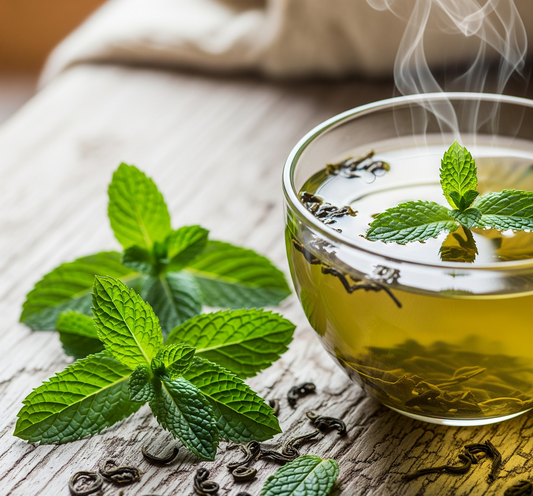This content explores chai tea, its origins, and health benefits. It discusses how chai tea may aid in weight loss, regulate blood sugar levels, promote heart health, and improve digestion. It also notes the lower caffeine content compared to coffee, making it a milder energy option with fewer side effects. However, it emphasizes the need for more research for definitive conclusions.
A type of tea making waves around the world today, chai tea, or as some people call it, chai tea latte is a type of tea known for its fragrant and spicy flavor profiles. People believe this wonder drink helps with everything from boosting heart health, aiding weight loss, and helping with digestive issues. But is there any truth to this statement? Is there any proof of the claimed health benefits of Chai Tea? Or is it just hearsay? We’re here to answer your questions.
What is Chai Tea?
While you might have heard of tea, you might be surprised that the word “Chai” also means tea. Well! Kind of! The word “chai” is just the Hindi word for “tea”, which was derived from the Chinese word for tea, “cha”.
But despite the meaning, what sets the Hindi “chai” apart from traditional Chinese “cha” is the mixing of strong spices with the tea leaves during the preparation process. It is more accurately called “Masala tea” in most parts of the world. But despite the redundancy (tea tea), for consistency, we will refer to “chai” as “chai tea”.

It’s also important to note here that the sweetened, creamier variation of the chai tea we’re so familiar with here in America is called the “chai tea latte”. Today chai tea is easily available in cafes and restaurants around you. But given the minimal ingredients and equipment you need to prepare a cup of fresh chai tea, you can also easily prepare it at home.
What are the Health Benefits of Chai Tea?
A cup of chai tea is loaded with tons of health benefits. Let’s look into some of the top benefits of chai tea below:
May Help with Weight Loss
Chai tea is prepared with cow or soy milk which is rich in protein. As protein is known to
Reduce hunger and promote a sense of fullness, it can help to reduce hunger and food cravings. The black tea in chai tea may also enhance the breakdown of fat, reduce calorie absorption, and promote weight loss. According to a report by the National Library of Medicine, drinking three cups of black tea per day may help prevent unwanted weight gain or gain around the belly area. The black pepper content and the various spices may also inhibit fat accumulation in your body.
However, you should keep an eye out for some chai tea varieties with added sugar and sweeteners as they can have negative benefits. So, if you’re looking to lose weight, try opting for unsweetened or homemade chai tea to maximize your health benefits.
May Reduce Blood Sugar Levels
Drinking chai tea may also aid in moderating blood sugar levels. This is because some spices like ginger and cinnamon have been proven to impact blood sugar levels. According to another report by the National Library of Medicine, cinnamon may reduce insulin resistance and fasting blood sugar levels by up to 10–29%. Furthermore, ginger has also been shown to reduce blood sugar levels by up to 12%.
To get the most health benefits of chai tea, avoid heavily sweetened versions that you find in café. Instead, try to prepare the drink from scratch yourself, adding more cinnamon and ginger than your typical recipes. You can also opt out of adding any sugar or adding a minimal amount. Keep in mind that drinking anything with excessive quantities of sugar can hinder blood sugar levels.
May Improve Heart Health
There is a lot of evidence that drinking chai tea promotes heart health. Apart from the fact that cinnamon may reduce blood sugar levels by almost 30%, it has also been proven to reduce blood pressure. Some studies have shown that cinnamon reduces the levels of cholesterol and triglycerides by up to 30%.

The study even also showed that as little as 120 mg of cinnamon per day may be enough to offer these health benefits. The black tea used to prepare chai tea may also lower blood sugar levels, and drinking three or more cups per day has been linked to an 11% lower risk of heart disease.
May Improve Digestion
A report on ResearchGate suggests that the cloves and cardamoms used to prepare chai tea have antibacterial properties that prevent digestive issues caused by bacterial buildup. Furthermore, black pepper also appears to have similar effects in addition to boosting digestive enzymes that are needed to break down food particles.
Please note that the conclusions of these studies are not unanimous and there are some discrepancies in the results. These conclusions were also based on tests that were done on animals. More research needs to be done to come up with definitive conclusions.
Does Chai Tea have Caffeine?
As tea leaves are a vital component of chai tea, you can expect there to be a fair bit of caffeine in your drink. Ultimately, the amount of caffeine will vary depending on the amount of Camellia sinensis tea leaves used for the blend. Another factor is where the tea plant was cultivated and how it was processed.

You can expect 40mg of caffeine in a normal cup of chai tea compared to roughly 120mg in an average cup of coffee. But that’s not all! Tea also comprises of a molecule called tannin which has a calming effect on the nervous system. It also causes the caffeine to be absorbed by the body much more slowly. This means that drinking chai tea can give you a caffeine boost without the crash or jitters that you might get from drinking coffee. Instead, it induces a calm, relaxed, and focused state of mind that lasts throughout the day.
Also because of the comparatively lower levels of caffeine in chai tea, you can enjoy extra cups without the buildup of extra caffeine and the migraines that affect most coffee drinkers. If you’re highly sensitive to caffeine, you can opt for Rooibos Chai (a naturally caffeine-free tea alternative. You can also opt for a caffeine-free version.




